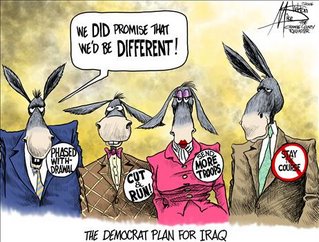Democrats Now Face Same Difficult Choices as Republicans

By Victor Davis Hanson
Will the Democrats' new control of the House and Senate shake things up that much abroad? They certainly will have plenty of opportunities to alter the present American course of fighting terrorists, the war in Iraq and our overall foreign policy.
For over three years, partisan opponents of the Bush administration have made two arguments against its conduct of the "global war on terror."
First, they've argued, the absence of another Sept. 11-like attack has not been the result of anything our government has done, here or overseas. Remember, after conditions in Iraq began to worsen, they began to say we were in even more jeopardy at home than we were five years ago.
Secondly, Democrats claimed, the detention facility at Guantanamo Bay, the Patriot Act and targeted wiretaps have probably hurt Americans' civil liberties more than they've harmed terrorists.
So there is at last the opportunity to match prior rhetoric with action by stopping the money for these efforts. Then we could at last learn whether Democratic critics were right that much of President Bush's actions to combat terror have been either superfluous or counterproductive.
Likewise, in regard to the war in Iraq, which many Bush critics have compared to Vietnam, we will soon see whether the Democrats have a viable alternative plan.
Right now, there are really only three courses of future action in Iraq, two of which were presented by different factions of the Democratic Party in the months leading up to the midterm elections.
The first choice, the logical response to criticism by some Democrats that the U.S. has had too few troops in Iraq, is to add more - as we did in Vietnam between 1964 and 1969.
The second - and opposite - choice, as proposed by Democratic Party Chairman Howard Dean and Congressman John Murtha, D-Pa., is to bring the soldiers home, or at least redeploy them elsewhere, whether immediately or on a timetable. That way we could wash our hands of the supposed fiasco in Iraq as Democrats once did when they cut off funds to Vietnam in 1974-5.
The third alternative is to try to improve upon the present unpopular course of staying on to train the Iraqi security forces to defend their own autonomy and ultimately take our place - something like what happened in Vietnam between 1971-3.
For all their past anger, the Democrats may opt for this third choice. Sure, Democrats will grumble, issue subpoenas, hold up Bush's nominations to various posts and have their most outspoken threaten flight from Iraq. But now that the elections - and all the campaign posturing - are over, it won't be surprising if the Democrats' bark proves, at least for a while, much worse than their bite.
Indeed, I suspect not all Democrats really believe the party's campaign rhetoric that Iraq is a lost cause, especially given that widely admired generals like John Abizaid, George Casey and David Petraeus (who have fared well when queried by Democratic senators in hearings and on trips to Iraq) still feel they can change tactics to secure the country.
Pulling out will endanger the Kurds, Iraqi reformers, the sanctity of U.S. pledges abroad, and the reputation of the American military for generations. It would be hard to believe Democrats want to someday read, as we do now of Vietnam, that we were close to stabilizing Iraq when the funding to do so was cut off.
Third, based on past democratic unease with the realism associated with former Secretary of State James Baker, now co-chair of the Iraq Study Group, as well as anger over what's happening in Darfur, I'd venture that some Democrats are a little uneasy about renouncing entirely the effort to promote strenuously human rights and democracy abroad. Not all believed Iraq was about oil or Halliburton.
Of course, most Democrats believe Bush is usually wrong - but maybe not always completely wrong. After all, Syria got out of Lebanon, Libya abandoned its weapons of mass destruction, and gulf sheikdoms have been pressured to reform - all of which might just operate in reverse if the U.S. is to abruptly withdraw from Iraq.
In short, despite the election posturing, the Democrats in charge of ensuring a lasting majority are, as of now, somewhat quiet. Can it be that they are seeing that the only choices we have had after Sept. 11 have been mostly either bad or worse - and that, for those in power hoping both to prevent another such attack on our soil and not to "lose Iraq," there aren't any easy solutions?
Victor Davis Hanson is a classicist and historian at the Hoover Institution, Stanford University, and author, most recently, of "A War Like No Other: How the Athenians and Spartans Fought the Peloponnesian War." You can reach him by e-mailing author@victorhanson.com.
(C) 2006 Tribune Media Services, Inc. Link
Comments